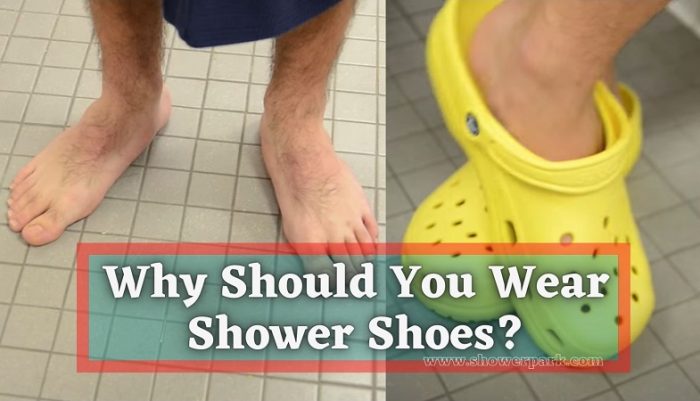Public showers can be nasty places. Whether it’s at a gym or hospital – you should always have something covering your feet. But why wear shower shoes, to be exact?
Even if some bathrooms look clean and pristine at first glance, you have no idea about what kind of germs may be lurking around. After all, you can’t spot such stuff with the naked eye.
Shower shoes should be a must-have item with you during your trips to communal places. Consider it as important as your own set of clothes – you wouldn’t want to wear someone else’s outfit in a public shower, right?
Not only is this kind of footwear protection for your feet from the grossness below, but it can also reduce the risk of slips and falls. How?
Well, shower shoes provide that grip and extra friction that your bare feet obviously can’t produce. The floor in a public shower is always wet and grimy. Do yourself a solid and put on a pair of flip-flops or slides.
Why Should You Wear Shower Shoes Anyway?
Unless you’ve been living under a rock, you’d know just how important shower shoes can be to your feet. It can be hard to avoid the gym or even hospital showers (if you’re an intern).
But that doesn’t mean that you should forego putting something on your feet. No matter how clean a shower room looks, trust us when we say that it’s a breeding place for germs.
All kinds of deadly pathogens lurk in wet and moist areas. Bathrooms are basically heaven for such microorganisms!
But, how do these tiny, dangerous microbes get into your body through your feet? The answer is through the cracks on the bottom of your feet. You heard that right. Germs can enter your body even through tiny scratches.
What Kind of Infections Am I Looking At?
Nobody takes shower shoes seriously until they get to know the consequences of not wearing them can be. So, here are a few names of the most common and dangerous infections that can attack you if you avoid feet protection.
Athlete’s Foot
Athlete’s foot – you’ve probably heard of this term at least once in your life. The infections stem from a fungus typically known as dermatophytes. This pathogen generally attacks moist areas, so the area in-between your toes are the most vulnerable.
On top of that, it can also infect the body by latching onto the hair, nails, etc. Basically, it seeks keratin to feed on.
Like all germs, dermatophytes also seek refuge in moist areas. Make sure to always dry your feet and in-between the toes once you’re done taking a shower. However, shower shoes can greatly reduce the chances of contracting this infection in the first place.
HPV (Human-Papillomavirus)
What’s worse than Athlete’s foot is HPV. Unlike the previous infection, this one is not as easy to avoid and cure afterward.
HPV also breeds in wet areas, so not wearing shower shoes can put you at risk of picking the microbes up. As usual, the virus can enter your body through cuts or scratches.
What happens next doesn’t end at rashes and itches. Instead, HPV causes growths to form on the soles of your feet. The infection is called Plantar Warts. These abnormal lumps can be quite painful and also make your feet heavier.
You will most likely find little black dots in the middle of the lumps. This is a result of clotted blood. The lumps can bleed or spread as well, so it is crucial to notice any changes.
Although taking time to cure, they do tend to go away on their own. However, if the pain and lumps persist, do seek medical help. Doctors might also prescribe you over-the-counter meds.
MRSA (Methicillin-Resistant Staphylococcus-Aureus)
MRSA tends to be a term that freaks people out and puts them in a frenzy. But there’s not much to worry about if you do wear shower shoes.
This is a skin infection caused by the bacteria Staphylococcus-Aureus. Unfortunately, it is resistant to methicillin, which has eventually given the infection its infamous title.
Similar to most diseases, this bacteria enters the body through cuts as well. However, they are most likely to be found in swimming pools. But there is no proof to be found that says you can’t find MRSA on wet floors as well. So, it’s better to be safe than sorry.
The infection can cause some serious symptoms, such as high fever and pus-filled boils. You will also require frequent visits to the doctor and some high-dosage pills to fight this bacteria.
Can You Wear Nike Slides in the Shower?
Absolutely. ‘Athleisure’ footwear is one of the best to wear as shower shoes since such pairs are usually made to be resistant to water. If not completely anti-water, they can dry pretty fast and also keep water at bay as much as possible.
Some people even prefer wearing crocs and flip-flops in the shower, but that’s totally your own preference. Slides, however, are better to wear since moisture tends to slip off of them easily.
This kind of footwear also has good grip and friction, so you won’t be cracking your head open like an egg anytime soon!
Do You Need Flip Flops for Hospital Shower?
If you consider the number of germs that could be breeding in a place where patients with diseases go – then yes, you need flip flops in hospital showers.
Don’t let the white corridors and antiseptic smell trick you into thinking hospitals are clean. Medical institutions are like a safe haven for all kinds of deadly diseases, and the showers are hotspots. So, please put on flip flops before you walk into a communal bath in a hospital.
Conclusion
“But why wear shower shoes if the floor is dry?” – This is one question you’ll hear from ignorant people. The moral of the story is, don’t be like them. Do your feet some good by wearing shower shoes whenever you walk into a bath-place, even when it’s dry.

